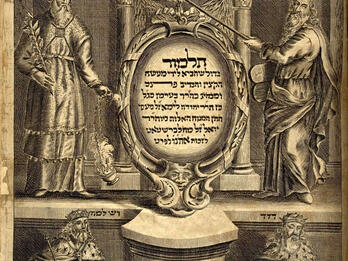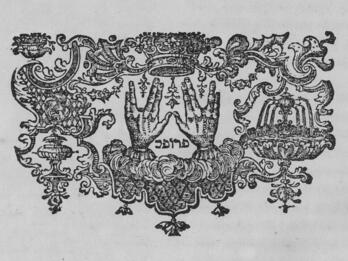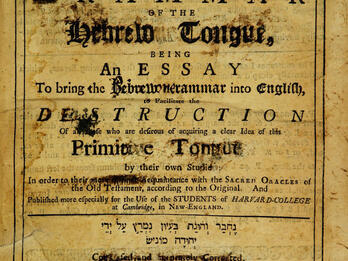Approbation for a Printing House
“That which is well known needs no proof,” and the root cause is the skilled operating of the printing shop in the holy community of Żółkiew [Zhovkva], may the Rock preserve it, which was established by the venerable leader R. Feibush, son of the rabbi and teacher Aaron Segal. Great is the benefit of this fine printing, in the beauty and elegance of the new type and its quality paper. This printing is indeed praiseworthy and excellent; it is seven times better than all the earlier blurry printings, all of which grew thorns like a face covered with stubble. But that is not true of this printing. Anyone who peruses it will rejoice and quench his thirst, and it will put the mind of every reader at ease. “Since everything that people find satisfactory, God likewise finds satisfactory” [m. Avot 3:10], and therefore it can be said: “this is the Torah and this is its reward” [b. Berakhot 61b]. And from us, accept the validity of our decree of ostracism, excommunication, and bans, of all forms and kinds, including a fine of one hundred gold pieces [lit., “reds”] upon any violator—and the fine does not release him from the excommunication and the bans and the punishments—that regarding all holy books, small and large, whatever they may be, anything that R. Feibush has to sell, it is absolutely forbidden for any printer outside of our state to bring any books in the holy tongue from outside the state. Likewise, all current booksellers, and any new booksellers who may arrive, are forbidden on the level of all the prohibitions of the Torah to bring them from outside the state to our state. Similarly, all books printed in the vernacular language, known as daytshvarg [German], up to ten pages long, no matter what they are, may not be brought at all from another state into our country; although it is permitted to bring a book, written in this vernacular, that is at least ten pages in length, unless it is a daytshvarg book printed by R. Feibush. This prohibition also applies to printers in the holy community of Kraków and the holy community of Lublin, may the Rock preserve them: they may not print any books, large or small, from outside our country and bring them into our country, on pain of the aforementioned punishments. If any individual or individuals are found to have violated the above prohibition, R. Feibush has permission and authority to take all the books from them, and none may oppose him. If anyone rises up against him, R. Feibush has the right to set out against him and stand up for himself even in gentile courts, at the offender’s expense. Our decree is valid in every court among the Jews: they must abide by R. Feibush and his representative, and may we fear God now and forever.
Twenty-four ministers, officers, dukes, and leaders of the Four Lands in the holy council, on market day, the time of communal assembly, Sunday the 26th of Elul [5]459 [1699].
This is the law regarding printing in the Jewish communities of the aforementioned cities Kraków and Lublin.
Credits
Published in: The Posen Library of Jewish Culture and Civilization, vol. 5.





